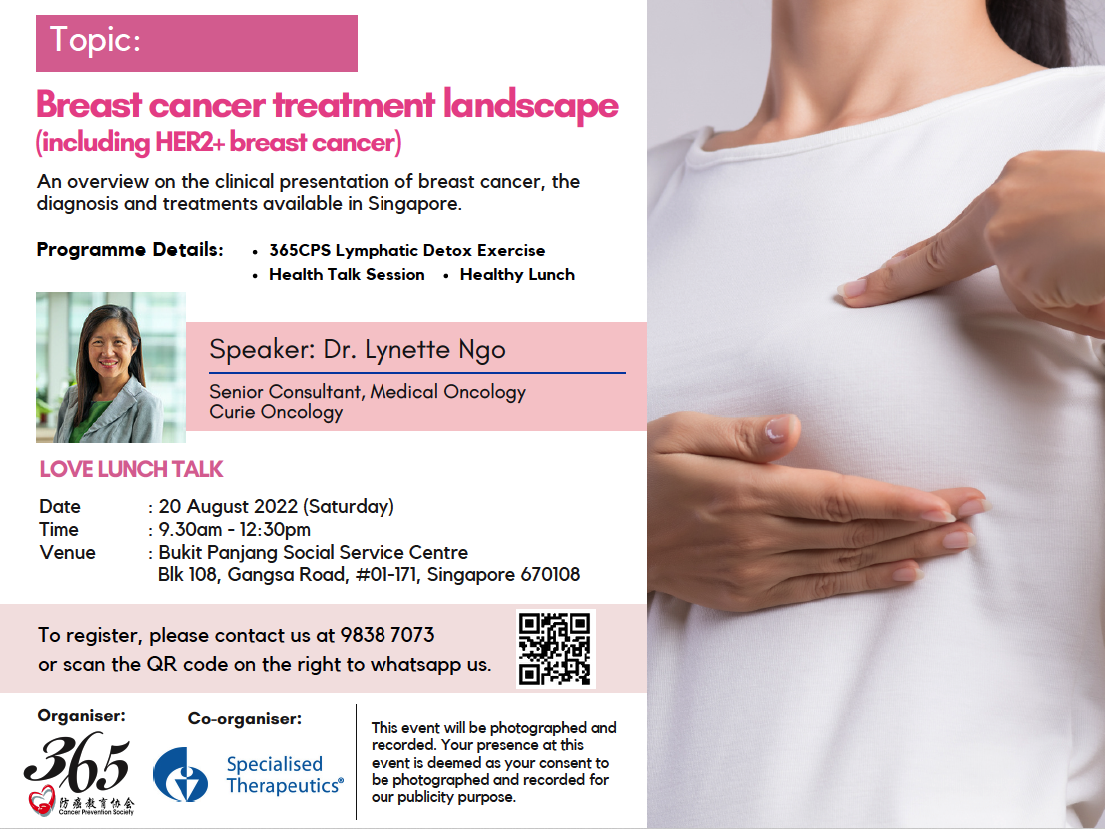Meet the Singapore Specialist: Medical Oncologist Dr Lynette Ngo

While 1 in 13 Singaporean women will be diagnosed with breast cancer in their lifetime – the highest incidence in South-East Asia – senior oncologist Dr Lynette Ngo wants her patients to know that five-year survival rates “are better than they have ever been”, even for those with advanced cancers.
“I have patients now with stage four cancers who were given six months to live, and they are now living eight or nine years,” Dr Ngo says.
“These impressive results are partly due to the availability of HER2-targeted therapies in recent decades and the response has been amazing.”
Dr Ngo will be speaking about the breast cancer treatment landscape at a 365 Cancer Prevention Society event on August 20 which is co-sponsored by Specialised Therapeutics. Here are some of her insights.
“What do I want women to know? I want them to know that there are a lot of advances in breast cancer and a lot of new medications. Survival outcomes are improving, even when women are diagnosed at the advanced stage.
Breast cancer is not just one disease and there are many sub-types. In Singapore we are lucky because we have access to most of the latest treatment options for breast cancer. The biggest problem women face is funding. But for patients who have insurance coverage, access to new therapies is not typically an issue.
Why is the incidence of breast cancer so high in Singapore? I would say that lifestyle and diet is playing a part. Many families in Singapore have adopted typical Western dietary habits and lifestyle choices. The diets of some women now include excessive amounts of red meat and animal fat, alongside a reduced intake of fruits and vegetables. This has led to an increasing average body weight of women in Singapore.
In addition, many women are working full time and do not have time for exercise. As well as a high fat diet, there can be quite a high alcohol intake as well.
Women are frequently having children at a later age, or having fewer children – or none at all. Some of them are choosing not to breastfeed. All of these factors have an impact.
I am advising my patients to modify their lifestyles and we try to help them implement diet and exercise programs for them when they have finished active chemotherapy. We follow the national guidelines, advising at least 150 to 300 minutes of moderate intensity aerobic activity every week, as well as strength training and functional balance at least three times a week. The American Cancer Society also recommends an alternative of 75 to 150 minutes of vigorous intensive physical activity per week.
Taking control of their diet and exercise is one thing women can do to try and reduce their risk of recurrence, and this is a very common fear among patients. It can also be quite debilitating. Some women want to come and see their doctor a lot more frequently and others want more frequent scans for reassurance. Taking some control back in their lifestyle is one way to manage their fear of relapse.
I originally worked in palliative care before I was drawn to working in oncology, specialising in breast and gynaecological cancers. It gives me great satisfaction to see patients smiling after everything they have been through and seeing them with their families and doing what they love.
I love helping women, seeing them defy the statistics, keep working and continue contributing to society. I really do love my job.”
*July 2022.
